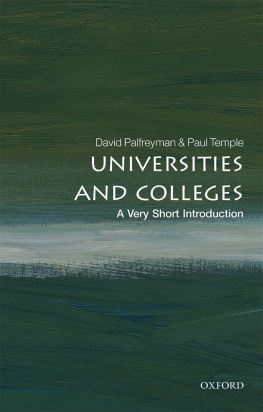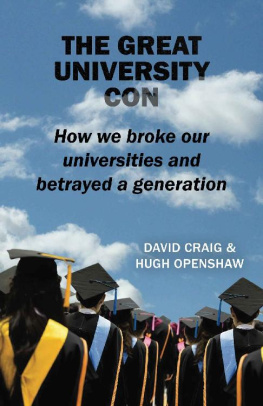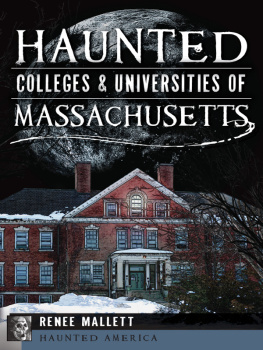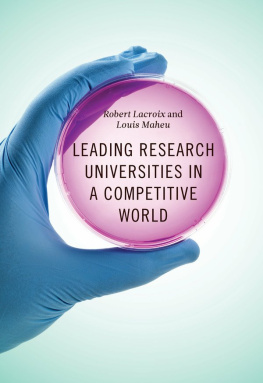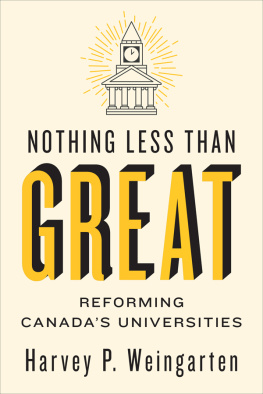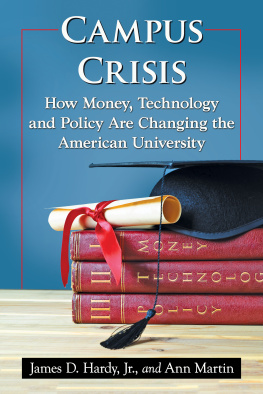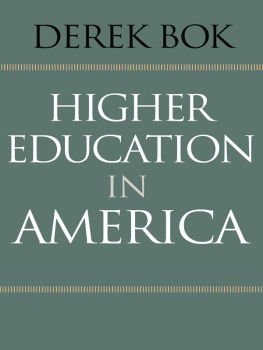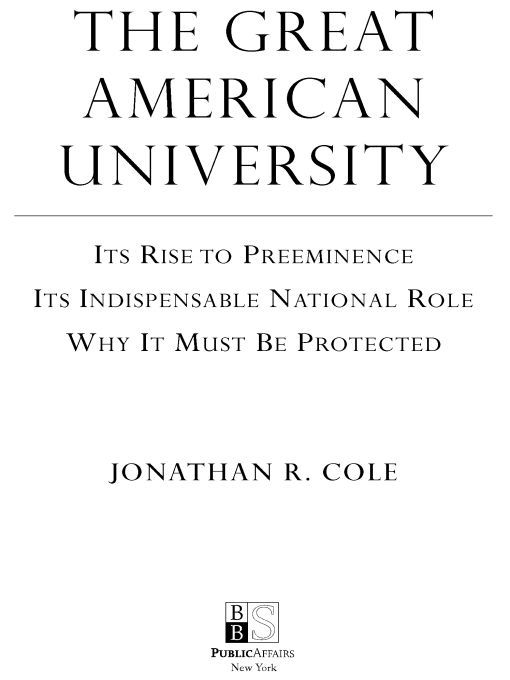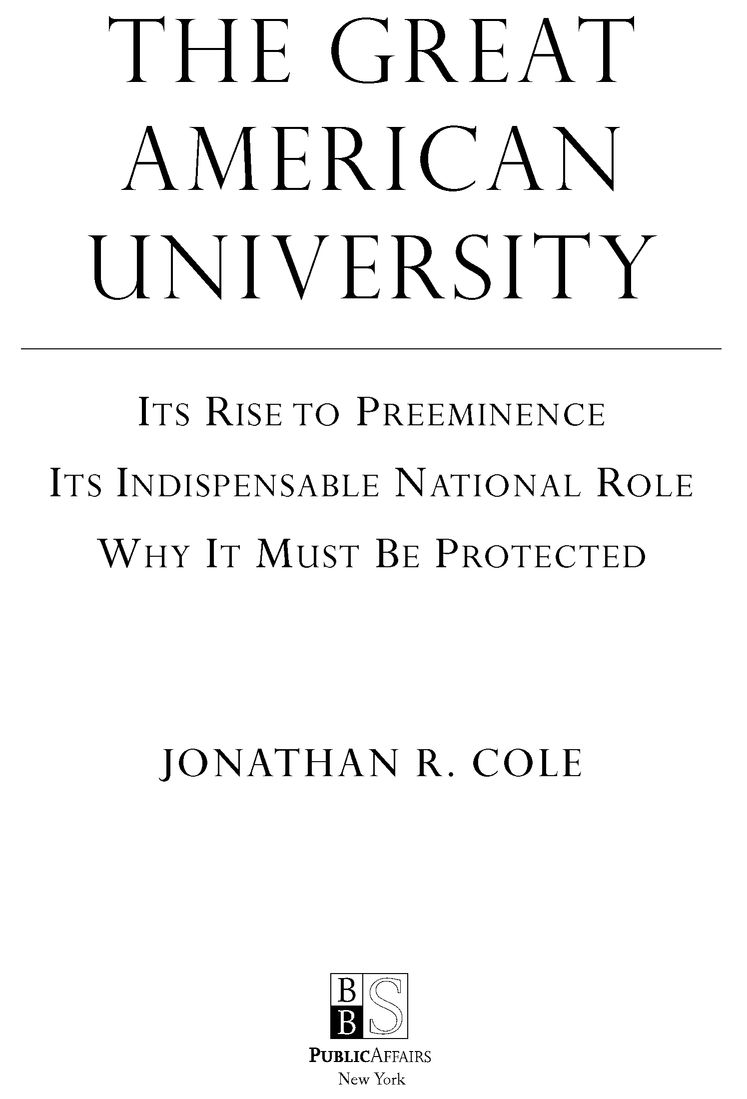Table of Contents
ADVANCE PRAISE FOR The Great American University
Many think that the principal mission of universities is to transmit knowledge; they miss the key point that teaching and research are inseparable. Jonathan Cole, a pioneer in the sociology of science and a visionary leader and spokesman for the academic community in the United States, emphasizes that to produce the best students, American universities must continue to discover new kinds of knowledge and new ways of thinking. If we are to move successfully to maintain American economic and research leadership in the twenty-first century, this academic mission needs to be better recognized, supported, and enhanced. This brilliant book is a must-read.
ERIC R. KANDEL,
professor, Columbia University;
Nobel Laureate in Physiology or Medicine
Everyone who is interested in how Americas public and private universities became the envy of the world, how they transform our lives in ways that we fail to appreciate, and how we are capable of destroying the goose that laid the golden egg, must read Jonathan Coles brilliant new book, The Great American University.
RICHARD C. ATKINSON, former director, National Science Foundation; president emeritus, University of California
Jonathan Cole has written a masterful book to be read and enjoyed by all of us who care for the guidance and teaching of young minds.
TORSTEN N. WIESEL,
president emeritus, The Rockefeller University;
Nobel Laureate in Physiology or Medicine
Jonathan Cole has done a great service by demonstrating how important our leading research universities are to the nation and how profoundly they affect the quality of our lives. He gives the most detailed and convincing analysis I have read of the conditions essential to the work of these institutions and the dangers that threaten their continuing success.
DEREK BOK,
president emeritus and research professor,
Harvard University
A monumental achievement, The Great American University explores the complex historical and cultural reasons for the international preeminence of American higher education; documents the profound contributions American research universities have made, and continue to make, to our nation and to the world; and identifies and analyzes the dangers that now threaten to undermine one of the strongest pillars of American excellence.
GEOFFREY R. STONE,
former provost, University of Chicago; author of
Perilous Times: Free Speech in Wartime
Drawing on the best talent from around the world and driven by the kind of competition we see in professional sports, American research universities have come to dominate the landscape of international higher education. In this fascinating book, Jonathan Cole tells us who built these teams of scholars and scientists to a championship level and why keeping them strong and innovative is a key to Americas future. Everyone will learn something by reading it.
DAVID J. STERN, commissioner, the National Basketball Association; former chairman of Columbia Universitys Board of Trustees
Jonathan Cole has given us a stimulating and provocative account of how the American research university came to be, the ideas it has contributed, and the challenges it faces. Not everyone will agree with all of the argument, but everyone can learn from it.
WILLIAM G. BOWEN, president emeritus, Princeton University; former president, the Andrew W. Mellon Foundation
For Joanna, Dan, Nick, Nonnie, Gabe, and Lydia
Preface
I have spent nearly fifty years at Columbia University, first as a student and then as professor and provost. I arrived as a freshman in 1960, earned a degree in history in 1964, and then turned my attention to sociology, receiving my Ph.D. in 1969. A few years later, I became a sociology professor at Columbia, and from 1989 until 2003 I served as provost and dean of faculties (its chief academic officer) before returning to teaching. Some say I bleed Columbia blue. I am, in fact, what they warn universities against: someone who could never cut the umbilical cord and move away from his mother university. It is generally not a healthy thing for either the individual or the university. There are always exceptions to the rule, however, and I would like to think that I am one of them. In any case, over the course of these years at Columbia I have come to appreciate the spirit of innovation and discovery that characterizes American research universities and the contributions the universities have made to science, technology, and our daily lives. Many of the advances that have taken place over the past century in a host of fields, including medical research, genetics, physics, engineering, and even the social sciences and humanities, are due to the pioneering work that has been done at these institutions and the spirit of academic freedom and free inquiry they embody.
During my years at Columbia, I have had the privilege of getting to know many talented faculty members who have been engaged in ground-breaking research. As provost, I also became acquainted with the presidents and provosts of most of Americas other great research universities. Observing firsthand how these men and women spent their time, I couldnt help but notice, again and again, their incredible commitment to their work. On campuses from coast to coast, both in the North and in the South, it is their commitment to excellence that has caused our universities to thrive, particularly over the past fifty or sixty years as the role of the research university has become so firmly established.
Presidents and provosts of universities are an especially hardworking lot. They often put in seventeen-hour days, six days a week, to improve the relative standing and quality of their schools. They strive to increase the resources available to them, to foster relationships between their institutions and their local communities, and to find new ways to improve access and financial aid, and sometimes they even manage to persuade members of Congress to adopt legislation favorable to universities and to reject harmful bills. Then there are the continual capital campaigns to increase giving by alumni and friends of the university that they must attend to, and the many hours needed to adequately defend the cost structures of their schools and to show why additional investments in them are not only warranted but necessary.
In part as a result of their leadership, our country is blessed with an abundance of first-rate research universities, institutions that are envied around the world. Yet, most Americans seem to take their quality for granted, unaware of what makes them so distinguished. Most Americans do care about the relative prestige and standing of our universities, especially during those few years when they are faced with the question of where to send their children as they leave the nest. Magazines and book publishers have made a fortune producing rankings and assessments of colleges and universities as a new crop of parents and children seek information every year. But the focus in those contexts is on undergraduate education. This perspective is understandable. In an attempt to keep parents and fledgling students informed about the opportunities at various schools and the relative costs, however, we have overlooked some of the reasons why universities are so important to our society, reasons that go hand in hand with their ability to educate our youth.


